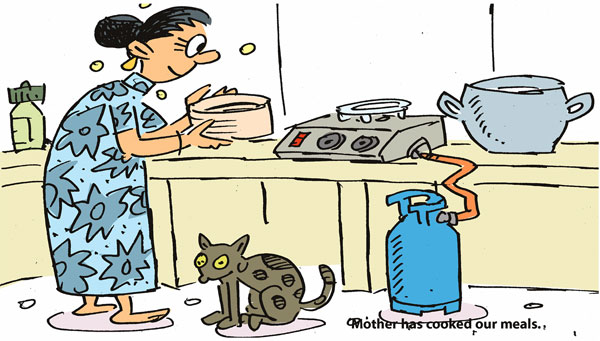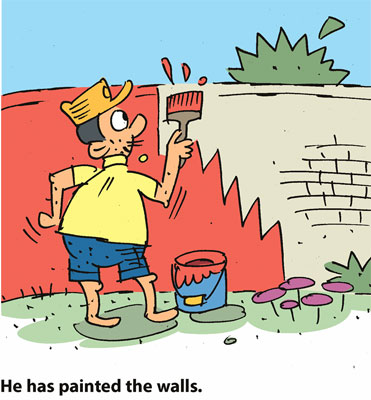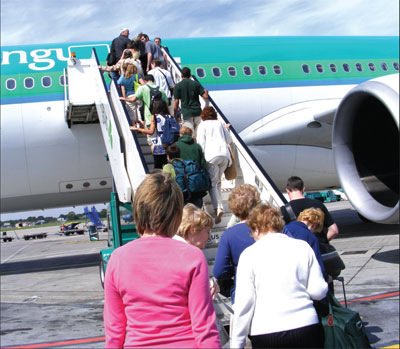|

by R. S. Karunaratne
Regular and irregular verbs
If a verb is regular, the simple past tense and past participle end
in `-ed.?
Infinitive Simple past tense Past participle
Clean cleaned cleaned
Finish finished finished
Use used used
Paint painted painted
Stop stopped stopped
Carry carried carried
Love loved loved
Marry married married
Cook cooked cooked
Kick kicked kicked
We use the past participle to make the perfect tenses.

Present perfect tense
She has cleaned the room.
We have finished the job.
He has painted the walls.
Mother has cooked our meals.
They have used chemicals to make paint.
Past perfect tense
She had cleaned the room.
We had finished the job.
He had painted the walls.
Mother had cooked our meals.
They had used chemicals to make paint.
We use the past participle to make the passive forms or Passive
Voice.
The room has been cleaned.
The walls have been painted.
The job has been done.
Our meals have been cooked.
Chemicals have been used to make paint.
With some irregular verbs, the infinitive, simple past and past
participle remain the same.
Infinitive Past simple Past participle
Hit hit hit
Put put put
Shut shut shut
Cut cut cut
With other irregular verbs, the past simple is the same as the past
participle.
Infinitive Past simple Past participle
Tell told told
Sell sold sold
With certain irregular verbs, all the three forms are different.
Infinitive Past simple Past participle
Wake woke woken
Drive drove driven
Swim swam swum
Some verbs can be either regular or irregular.
Infinitive Simple past Simple past
regular irregular
Burn burned burnt
Dream dreamed dreamt
Lean leaned leant
Learn learned learnt
Smell smelled smelt
Spell spelled spelt
Spill spilled spilt
Spoil spoiled spoilt
[ Activity]
Supply the missing verb form in the following list of irregular
verbs. Check your answers with the key.

Infinitive Simple past tense Past participle
1. Beat beat ..............
2. Become ............ become
3. Begin began ..............
4. Bend ............ bent
5. Bet bet ..............
6. Bite ............ bitten
7. Blow blew ..............
8. Break ............ broken
9. Bring brought ..............
10. Broadcast ............ broadcast
11. Build ............ built
12. Burst burst ..............
13. Buy ............ bought
14. Catch caught ..............
15. Choose ............ chosen
16. Come came ..............
17. Cost ............ cost
18. Creep crept ..............
19. Cut ............ cut
20. Deal dealt ..............
21. Dig ............ dug
22. Do did ..............
23. Draw ............ drawn
24. Drink drank ..............
25. Drive ............ driven
Key:
1.beaten 2. became 3. begun 4. bent 5. bet 6. bit 7. blown 8. broke
9. brought 10. broadcast 11. built 12. burst 13. bought 14. caught 15.
chose 16. come 17. cost 18. crept 19. cut 20. dealt 21. dug 22. done 23.
drew 24. drunk 25. drove
Starters:
How to use `be? verbs
`Am, is? and `are? are `be? verbs. They are used only in the present
tense.
I am a teacher.
He is a carpenter.
She is a typist.
It is a tree.
|

They’re leaving for London |
We are students.
They are boys.
You are innocent.
In conversation and informal writing, we use contractions. A
contraction is a form of a word or combination of words which is often
used instead of the full form in spoken and informal English.
I?m in the class.
He?s busy.
You?re free to go home now.
It?s given free.
We?re from Jaffna.
They?re leaving for London.
To make questions with ?be? verbs, we put the verb before the
subject.
Statement: I am late.
Question: Am I late?
Statement: He is a graduate.
Question: Is he a graduate?
Statement: She is a teacher.
Question: Is she a teacher?
Statement: It is raining.
Question: Is it raining?
Statement: We are writing.
Question: Are we writing?
Statement: The principal is coming.
Question: Is the principal coming?
Statement: You are painting the wall.
Question: Are you painting the wall?
Statement: Your books are on the table.
Question: Are your books on the table?
[Question words]
`Who, what, where, why, how? and `when? are question words. You can
use them with `am, is? and `are.?
[Who]
Who am I?
Who are you?
Who is she?
Who are they?
Who are we?
[What]
What am I to do now?
What is he doing?
What is she sewing?
What is Piyal writing?
What are they cooking?
What are you looking at?
What are we doing here?
[Where]
Where am I?
Where are you going?
Where is he working?
Where are they living?
Where are we going to stay?
[Why]
Why am I here?
Why is he absent?
Why are they late?
Why are you silent?
Why are we leaving now?
[How]
How am I to know his address?
How is she coping with the problem?
How are they keeping?
How are we going to do this?
How are you?
[When]
When am I to get the results?
When are we to meet him?
When are you coming?
When is he leaving?
When are they coming?
To make negative sentences with `be? verbs, we put `not? after `am,
is? and `are.?
I am not coming.
They are not helpful.
We are not happy.
You are not busy.
We can make contractions with ?n?t.?
He isn?t coming today.
They aren?t here now.
We aren?t happy here.
You aren?t busy.
Note: We cannot contract `am not?.
We use ?be? verbs with the following words.
I am hungry.
She is thirsty.
You are right.
It is hot.
You are wrong.
I?m afraid.
We are interested in music.
Emma is ten years old.
They are in their twenties.
What size is your shirt?
How old are you?
[Activity]
Fill in the blanks with ?am, is? and ?are.? Check your answers with
the key.
1. You ......... always late.
2. My sister ......... a dancer.
3. Mary and John ........... in Canada.
4. I .......... very happy today.
5. I think you ........... hungry.
6. My house .......... very big.
7. My name ....... Anton.
8. ....... Raman an Indian?
9. Who .......... that man?
10. Where ........... Cyril and Abraham?
Key: 1. are 2. is 3. are 4. am 5. are 6. is 7. is 8. Is 9. is 10. are
Form adjectives from nouns
Words often come in families. You can expand your vocabulary by
becoming familiar with these word families. In the following quiz we
give 25 nouns in column ?A.? Fill in column ?B? with the relevant
adjectives and check your answers with the key.
Column A Column B
1. Week ............
2. Weight ............
3. Welcome ............
4. West ............
5. White ............
6. Whole ............
7. Width ............
8. Wild ............
9. Willingness ............
10. Win ............
11. Winter ............
12. Wire ............
13. Woman ............
14. Wonder ............
15. Wood ............
16. Wool ............
17. Word ............
18. Work ............
19. World ............
20. Worry ............
21. Worth ............
22. Writing ............
23. Wrong ............
24. Year ............
25. Youth ............
Key:
1. weekly 2. weighty 3. welcome 4. western 5. white 6. whole 7. wide
8. wild 9. willing 10. winning 11. wintry 12. wiry 13. womanly 14.
wonderful 15. wooden 16. woollen 17. wordy 18. workable 19. worldly 20.
worried 21. worthy 22. written 23. wrongful 24. yearly 25. young
Concluded |


